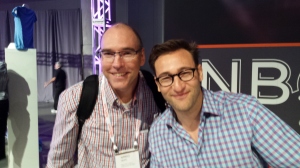Last week I joined 10,000 other marketers from around the globe in Boston for INBOUND 2014. It’s the largest conference of its kind for inbound marketers. Not only were there great speakers and the brightest minds sharing their expertise about marketing inside and out, but inspirational leaders as well. I’d like to share some lessons from three of these inspirational keynote speakers.
Archives for September 2014
Lessons from INBOUND 2014
September 23, 2014 by Leave a Comment
Simon Sinek – Author of Start With Why and Leaders Eat Last.
I can’t even begin to say how excited I was that Simon Sinek was speaking at this conference. Since first learning about him a few years ago I have become a huge fan of his work. Do yourself a favor and check out his books and watch his TED Talks. His talk about leadership did not disappoint. A few highlights:
“Leaders take care of the people, people take care of the numbers.”
“It’s not about the metrics, it’s about the tree in the distance.” Meaning we need to have something to strive for. The striving for is the part that brings us together for a common goal. You need a vision.
The sacrifice of being a leader is time and energy.
I was thrilled to be able to sit in on a question and answer session with him after his keynote, and I was lucky enough to meet him during a book signing. When I started telling him a story about my work experience and my own downsizing, he stopped signing my book to look me in the eyes as I spoke. He gave me 100% of his attention. He is a fantastically brilliant, and humble person, and possesses a great sense of humor. It was an honor to hear him speak and meet him.
Malcolm Gladwell – Author of Outliers, The Tipping Point, David and Goliath and others.
He gave a wonder talk on the 3 components needed for transformation.
1) Attitude – Needed for you to change habits of mind. The proper attitude also gives you the courage to be independent.
2) Imagination – You need this in order to re-frame the problem. If you re-frame the problem, the solution is possible.
3) Urgency – Allows you to push yourself harder and faster than you would normally. This gives you speed to the market your competitors can’t match.
Shiza Shahid – Founder of the Malala Fund
She gave a powerful talk on what is needed to change the world. She said, “We are the caretakers of our combined human destiny.”
She also spoke about our power to create change, “You can change what you cannot accept.”
She also gave perhaps one of the most moving lines I’ve heard in a while, “We are the ones we’ve been waiting for.” We don’t need to rely on others; we have the power to make the world a better place.
Those are a few of the highlights; of the many I took with me. My week in Boston was about being inspired, making great friends, and learning some new marketing lessons. What a transformational week. I can’t wait to see what I can accomplish until INBOUND 2015 takes place.
The Difference Between Pros and Amateurs
September 9, 2014 by Leave a Comment
 I play golf maybe once a week. My goal is to break 90, but I’m struggling to accomplish that. At times I’m getting closer, others it’s far off. I also have to take into account that the golf season in Wisconsin is six months long. By the time spring rolls around, I’m rusty and it takes months to get my swing back.
I play golf maybe once a week. My goal is to break 90, but I’m struggling to accomplish that. At times I’m getting closer, others it’s far off. I also have to take into account that the golf season in Wisconsin is six months long. By the time spring rolls around, I’m rusty and it takes months to get my swing back.
I was watching one of the PGA events on TV recently and the pro golfers were out practicing every element of their game before playing their round. They spend hours practicing before competing in a tournament, not to mention the practice rounds earlier in the week to get a feel for the course.
I go out once a week (without having practiced) expecting to play a flawless game. That’s an unrealistic expectation. In order to go out and perform at a high level I should practice the skills to get me to a place where that is possible. Sure, the stars may align and everything could go my way, but odds are not in my favor.
If we want to become good at something we need to practice. That’s the difference between pros and amateurs. Pros practice to keep up their mastery. Amateurs work to get to a certain level of comfort and once that is achieved practice is forgotten.
There are things I’m good at. I’ve spent my time to develop those skills. We all have talents that we’ve honed with practice. Lots of it. Malcolm Gladwell has stated that it takes 10,000 hours of practice to master something. We can’t expect to be great at something without putting in that sort of time commitment.
What about those people who look like things come effortlessly to them? The truth is it’s not natural talent. It took determination and hard work. Respect the time and effort they devoted to their talent. We didn’t see them struggle, sweat, and work when no one was watching. We see the results. Looking at the box score is looking at the result, Earning a degree is a result.
High achievers sacrificed a lot. They could have used those 10,000 hours to party with friends or watch TV, but they didn’t.
Think of the things you’re good at. How much time did you devote to gain that level of expertise? More than you think. If you don’t spend the time to get better, you can’t expect to go pro.

Follow Me!